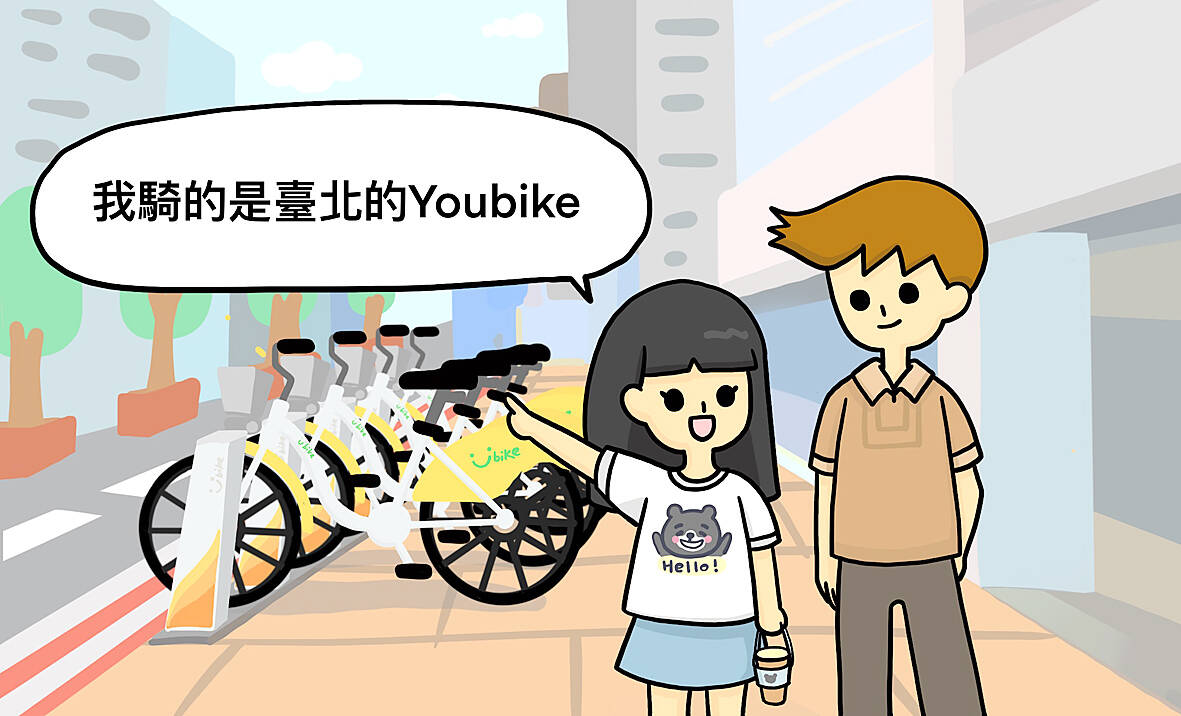對話 Dialogue
馬克:小實,我剛才在路上好像看到你騎腳踏車。
Make: Xiǎoshí, wǒ gāngcái zài lùshàng hǎoxiàng kàn dào nǐ qí jiǎotàchē.

小實:對啊,那是我沒錯,我是騎車來學校的。
Xiaoshi: Duì a, nàshì wǒ méicuò, wǒ shì qíchē lái xuéxiào de.
馬克:是嗎?那你的腳踏車在哪裡啊?
Make: Shì ma? Nà nǐ de jiǎotàchē zài nǎlǐ a?
小實:那不是我的車,我騎的是臺北的YouBike。
Xiaoshi: Nà búshì wǒ de chē, wǒ qí de shì Táiběi de YouBike.
馬克:YouBike是什麼?大家都可以騎嗎?
Make: YouBike shì shénme? Dàjiā dōu kěyǐ qí ma?
小實:對啊,YouBike是一種共享的腳踏車,用「悠遊卡」就可以租一輛YouBike喔!很方便。
Xiaoshi: Duì a, YouBike shì yìzhǒng gòngxiǎng de jiǎotàchē, yòng yōuyóukǎ jiù kěyǐ zū yí liàng YouBike o! Hěn fāngbiàn.
馬克:聽起來很棒,我下次也要試試看。
Make: Tīng qǐlái hěn bàng, wǒ xiàcì yě yào shìshìkàn.
翻譯 Translation
Mark: Xiaoshi, I just saw you riding a bicycle on the road.
Xiaoshi: Yeah, that was me. I came to school by bike.
Mark: Really? Where is your bicycle then?
Xiaoshi: Oh, that’s not my bike. I’m riding a YouBike in Taipei.
Mark: What is a YouBike? Can everyone ride?
Xiaoshi: Yes, YouBike is a shared bicycle. You can rent a YouBike with an “EasyCard!” It is very convenient.
Mark: Sounds great, I’ll give it a try next time.
單字片語 Vocabulary
1. 騎 (qí) to ride
2. 腳踏車 (jiǎotàchē) bicycle
3. 共享 (gòngxiǎng) share
4. 悠遊卡 (yōuyóukǎ) EasyCard
5. 租 (zū) rent
6. 聽起來 (tīng qǐlái) sounds
7. 試試看 (shìshìkàn) try it
教材音檔 Audio Files
教材影片 Video Files:
https://www.instagram.com/celc.nou_tw/guide/_/17999106352646292/
實踐大學華語中心提供
By Shih Chien University Chinese Language Center: https://chineseusc.com/

A: In its latest annual travel guide, Bloomberg recommended two restaurants in Taipei: Golden Pig barbeque from South Korea and two-Michelin-star restaurant A. B: Also, tourists should definitely try Taiwanese cuisine while they’re here. Mountain & Sea House, Shin Yeh Taiwanese Cuisine, and Fujin Tree Taiwanese Cuisine & Champagne are good options. A: For local snacks, Fu Hang Soy Milk, Fu-Ba-Wang Pigs’ Knuckles Restaurant, and Wang Ji Rice Dumplings are all very popular. B: And the gold medalists of the 2025 Taipei International Beef Noodle Festival — Yun Shui Kitchen, The Howard Plaza Hotel Taipei, and Come N’ Eat

A: Bloomberg just released its annual travel guide, titled “25 Best Places to Travel in 2026.” What were the best Asian destinations? B: There were actually six Asian hotspots: Taiwan’s Taipei, Malaysia’s Penang, Kazakhstan’s Almaty, Indonesia’s Rote Island, India’s Tiger Reserves, and Oman. A: With its mix of traditional food and modern cuisine, Taipei has become a rising food capital in Asia. B: As Bloomberg reported, “Taiwan is a place that bubbles up in culinary conversation because of its famed beverage, bubble tea, and its early adoption of modern night markets.” A: And Din Tai Fung has now

Facing relentless flooding and rising expenses, Dumble Farm in England has stopped selling milk and started an unexpected but therapeutic venture: cow cuddles. In 2022, the owners sold most of their dairy cows and began letting visitors spend time brushing, petting, and even hugging specially trained Highland cows for 95 pounds per session. This unusual shift reflects the rise of the so-called healing economy, a sector where animal-assisted experiences are marketed as emotional remedies for stress and burnout. While dogs and cats remain the most common therapy animals, cows are gaining popularity for their calm nature. At Dumble Farm, only cows that

Owls have long fascinated people with their distinctive appearance and mysterious habits. These nocturnal birds possess large, round eyes and a flat facial disc. Their feathers come in shades of brown, gray, or white, helping them blend easily into the darkness. The most remarkable trait of owls is that they can turn their heads without damaging blood vessels. Contrary to popular belief, they can only rotate their heads up to 270 degrees, not 360 degrees. Owls have 14 cervical vertebrae, which is twice as many as humans. This special physical structure compensates for their inability to move their eyes within their